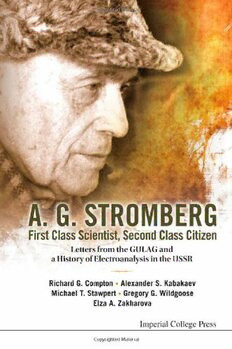
A.G. Stromberg - First Class Scientist, Second Class Citizen: Letters from the Gulag and a History of Electroanalysis in the USSR PDF
376 Pages·2011·2.296 MB·English
Most books are stored in the elastic cloud where traffic is expensive. For this reason, we have a limit on daily download.
Preview A.G. Stromberg - First Class Scientist, Second Class Citizen: Letters from the Gulag and a History of Electroanalysis in the USSR
Description:
Armin G Stromberg was arguably one of the founding fathers of the technique of stripping voltammetry frequently used in chemical analysis, yet he is virtually unheard of in Western scientific circles. He was a brilliant scientist, but due to his German ancestry he was interred in one of the NKVD GULAG camps at the outbreak of the Second World War. This semi-biographical history presents the complete set of 74 surviving letters written by Stromberg to his wife during this period. The letters provide both historians and the interested public with a rare and unique glimpse into the everyday living conditions of inmates in one of the GULAG labour camps. The book also traces Stromberg's life following his release. More importantly, it relates how he founded the thriving Tomsk school to the wider historical context of electroanalysis in the USSR, drawing conclusions about the rate of scientific development as compared to the West and showing how 'wet analysis' remained of vital importance to industry long after equivalent measurements were made elsewhere. Readers will also appreciate how Stromberg's invaluable contributions in the Tomsk School of Electroanalysis laid the foundations for the extensive metallurgical extraction and nuclear industries that dominated the entire Siberian region for many years. This book is a must-read for anyone interested in the life and times of an important, yet often overlooked scientist of the Second World War.
See more
The list of books you might like
Most books are stored in the elastic cloud where traffic is expensive. For this reason, we have a limit on daily download.
